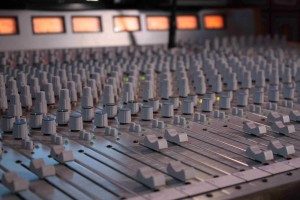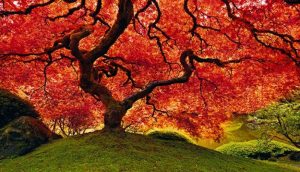
I started playing piano when I was 3 or 4 years old, almost 51 years ago. My grandmother had been an opera singer in NYC in the early 1900’s. When I was growing up she used to house various Juilliard students, usually the visiting Russian piano students or competition participants. So some of my earliest memories are of amazing virtuosic piano music filling the house. As a child I used to sit at the piano for hours with my forehead touching the piano, and letting the sounds of the struck strings vibrate through me, the evolving sound wash around me, like an ocean of possibility.
I have had a lifelong love affair with the topography of sound. (to·pog·ra·phytəˈpäɡrəfē/noun 1.the arrangement of the natural and artificial physical features of an area.) I experience sound as the sum and difference of the layers of detailed vibration in 3-dimensional space. I have a physical response to phase coherence that starts in my teeth. My brain and my ears seem to register detail at extremely fine levels. Pitch and intonation, heterodyne and dynamics, all register with me as a kind of flavor and what “feels” right.
When I teach about audio and mixing, I always talk about hearing the “intuitive correctness” of the Mix , the sense of proportion and detail with color and dynamics. This comes from listening on a deeper level, and also having heard many different approaches to a wide variety of styles and mixes. I talk about hearing completed mixes before even beginning the process. Michelangelo described his process as: seeing a block of stone and then removing everything that was NOT what he was seeing already buried in the stone. I feel the same about Mixing and Sound Design and Music. To really hear the essential piece, and then remove everything that is NOT the best possible presentation, to make every effort to move towards a completed sound.
I also love the exploration of psychoacoustics and sound. I am always curious how a different physical space can change completely the way something sounds and responds. I love finding clarity in a muddled mix. I love solving problems that seemingly cannot be solved. That is why I have spent the better part of the last 35 years studying and training and applying that passion to what I do. I believe that real Craft is a never ending learning experience. That Art is an iterative process, and with each iteration, each project teaches us something new that can be used on the next, and so on.
When I was in my early 20’s I studied and trained under a Master Audio Craftsman, Bruce Nazarian, who passed away recently. He was an extraordinary talent. He had perfect pitch and a photographic memory. He also had a deep and intuitive understanding of how sound really worked. I spent 4 years training as a Synclavier programmer and an apprentice and then journeyman Mixer/engineer. We became lifelong friends, and his recent passing effected me deeply. He was generous and strict, demanding and also a fantastic source of information and inspiration, and always encouraging me to be the best I could be. That kind of mentoring and sponsorhip is rare nowadays.
When I was working for Michael Jackson he would often ask us for something that was seemingly impossible to achieve. (At that time serious Digital manipulation was still in its infancy). We were tasked with finding solutions that were both creative and technical, but had never been done before, and we always managed to find the best of both worlds in that exploration.
These early experiences served to shape my perspective, and instilled in me a sense of wonder and a passion for exploration and problem solving at the highest possible levels. A deep desire to immerse myself in the evolving project of becoming a true craftsman through training, study, experience and curiosity.
I am also lucky that I started out as a musician, and continue that discipline to this day. I hear things in terms of rhythm and connectivity and dynamic flow, layers and subtleties, respiration and inspiration. There is a compositional element to any mix or sound design, and I believe that, as a musician, I can hear that layered interaction in clear and important ways.
Craftsmanship cannot and should not be replaced by expedience. Digital era media has a certain need for immediate gratification, and a tendency towards thinking that the tools of the trade define the craft. Technology has become a means to itself, and its inherent methodology of planned obsolescence, and a forward press towards ever more powerful and complex tools tends to marginalize the process of iterative learning and slow and patient acquisition of deep skill. This incessant forward march negates in some ways the need for real Craftsmanship by presenting expedient solutions, but without the fundamental foundation of Craft and methodological experience. Then these tools just become pretty lights and fun buttons to push, and then they form the foundation prevalent in modern production process of: “option anxiety”.
I also talk to my students and apprentices about “Two tin cans and a wire”. Meaning: it is never the tool that determines the solution, but rather the person using the tools at hand. Too often these days Mastery is thought of as knowing a particular Software tool or DAW, or which button to push, but in fact Craftsmanship is so much more then simply knowing how a certain piece of software works. It is the essential capacity of the Craftsman to have experienced many varied scenarios and solutions, and that by looking at a production issue or problem to be solved or explored, a clear and unfettered pathway opens up towards the best possible resolution.
As a freelance audio professional and human being, I am also always looking for deeper connections in terms of purpose and service. I am looking for projects that not only have high ideals artistically or creatively, but also seek to serve a deeper purpose than just pure entertainment. Although I love a good fun project, I also know that I want to apply my experience and skills towards problem solving and creative collaboration or projects that serve the greater good. I have worked for several non-profits as an A/V media consultant, helping find solutions for Live-streaming and Post solutions for non-traditional venues, and I have found that to be really rewarding.
I see the challenges for the future of Audio Craft in terms of finding balance, (an apt metaphor I believe), between Technology and the creative human experience, by integrating tools with training and experience, and an innate sense of commitment to the path of true craftsmanship as a lifetime practice.
If you or someone that you know is working on a project, or know of a situation or company that needs cost effective and high quality audio services, that values craftsmanship and team oriented problem solving, please contact me. I would love to be of service in that way.

